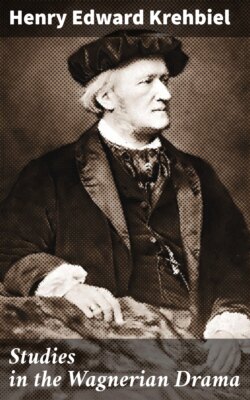Читать книгу Studies in the Wagnerian Drama - Henry Edward Krehbiel - Страница 8
На сайте Литреса книга снята с продажи.
ОглавлениеFOOTNOTES:
[A] For popular purposes there is no harm in letting this statement stand as made. Of course the reference goes only to the Greek theatre in its latest form, the evolution of which is indicated, perhaps, in the comparative weakness of the bond which unites the chorus to the action in Euripides. The orchestra was, in fact, the centre around which all the rest, the theatron and the skēnē, were gradually grouped. In the antique festal plays the principal feature was the dance in a circle around the thymele, or altar of Dionysus. It was only by a slow process that the actor came to be thought of as anywise distinguished from his companions. As generally in ancient art priority was indicated by height, there is here a reason for the tragic cothurnus, which might be said to be an inexplicable deformity on any other theory; for it was only by putting them on stilts, so to speak, that it was possible to indicate the participants in the dialogue as apart from the general rout of dancing worshippers. Even in the time of the three great dramatic writers, it seems probable, disturbing as such an idea may be to popular impressions, that some, if not all, plays were performed without any stage. The word skēnē (tent) points to a temporary structure, used in the first place, perhaps, as a shrine for the symbols and properties of the god (like the Tabernacle of the Israelites), then as the dressing-room of the actors; it was succeeded by the temple when the place had become consecrated to the worship of Dionysus, then by the structures suited to a given play, and finally by a permanent stage, which gradually encroached on the space that had once belonged to the orchestra. These conclusions, at least, seem to be borne out by the discoveries and arguments of Dörpfeld.
[B] Naumann's History of Music, vol. i., p. 524.
[C] Mephist. Du weisst wohl nicht, mein Freund, wie grob du bist? Bac. Im Deutschen lügt man wenn man höflich ist.
GOETHE. "Faust," Part II., Act 2, Sc. 1.
